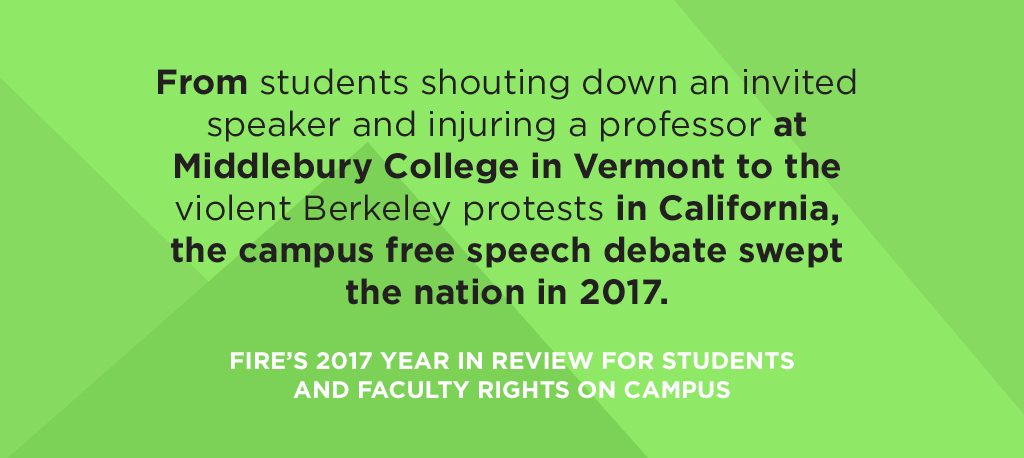The campus speech wars will continue in 2018 according to Suzanne Nossel, executive director of PEN America, in a recent interview on NPR, “College Students Clash Repeatedly Over Free Speech Issues.”
The Foundation for Individual Rights in Education, or FIRE, keeps up with, reports on, studies, surveys, and writes reports “to defend and sustain individual rights at America’s colleges and universities.” In a report of its 2017 activities, FIRE focused on four issues pertaining to students’, teachers’, and others’ rights to speak freely on campus even if we don’t like what they might say.
In February, FIRE released the first-ever nationwide report on campus Bias Response Teams—teams that encourage students to formally report on one another and on faculty members whenever they subjectively perceive that someone’s speech is “biased.” The report found that 232 public and private American colleges and universities publicly maintained bias response programs, affecting an estimated 2.8 million students.
Colleges can’t legally “quarantine” free speech and FIRE’s Stand Up For Speech Litigation Project won when the U.S. Court of Appeals for the Eighth Circuit upheld FIRE’s victory at Iowa State University. Then in March, the project filed a new lawsuit against the Los Angeles Community College District that aims to free over 150,000 students from unconstitutional free speech zones. The litigation project’s 13 total lawsuits have so far restored free speech rights to more than 270,000 students.
In May, Tennessee passed bipartisan legislation that FIRE called “the most comprehensive state legislation protecting free speech on college campuses that we’ve seen be passed anywhere in the country.” The legislation requires institutions to adopt policies consistent with the University of Chicago’s Free Speech Policy Statement which “guarantees all members of the University community the broadest possible latitude to speak, write, listen, challenge, and learn.” The legislation in Tennessee prohibits the use of misleadingly labeled “free speech zones,” bars institutions from rescinding invitations to speakers invited by students or faculty, and more. Campus free speech legislation also passed this year in Colorado, Utah, and North Carolina.
In October, FIRE released a groundbreaking survey on free speech that found a majority of students on college campuses self-censor in class, support disinviting some guest speakers with whom they disagree, and don’t know that so-called “hate speech” is usually protected by the First Amendment. The study also found that Republican and Democratic students have different opinions on campus protests, disinvitations, and hate speech protections.

